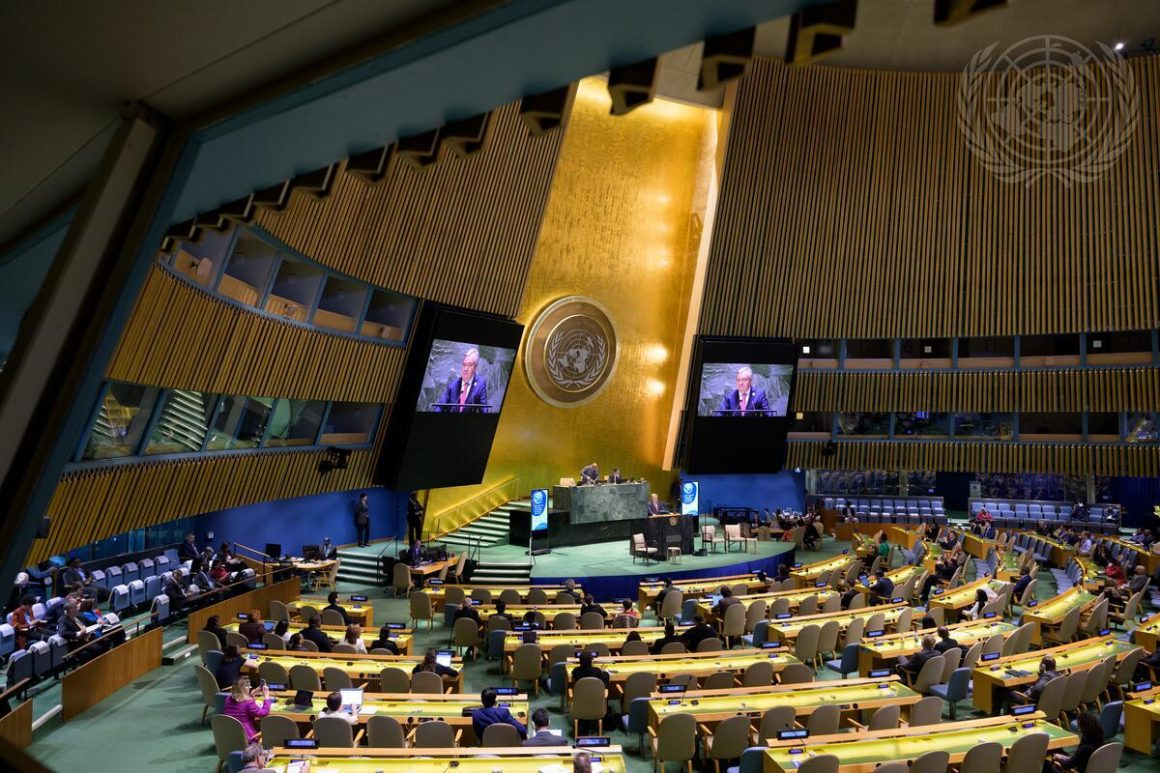H.E. The President of the GA*
Ambassador Dennis Francis
UN
New York
Your Excellency,
As a former UN staff member I participate in an informal Peacemaking Reflection Group (PRG), which follows from our respective locations and situations the work of the UN. Members of the Group welcome and would like to thank you for convening the first-ever Sustainability Week in your capacity as President of the General Assembly. But I would also like to submit a few thoughts, in the hope that you may find them constructive and worth taking into account in your subsequent work.
As members of the UN, governments committed to “save succeeding generations from the scourge of war”. Consequently world leaders made it quite clear In the Agenda 2030 , that they were “… determined to foster peaceful, just and inclusive societies which are free from fear and violence. There can be no sustainable development without peace and no peace without sustainable development.” But it appears that the current GA is losing this focus on and for the primary purpose of the UN.
Of course, even today the vast majority of people fortunately live in peaceful countries. And clearly the GA has to be responding to the needs of this majority. But the current wars raging in a few countries, cripple the majority in finding the needed public and private investments for the transformation to a sustainable economy. Raised expenditures in armaments reduce public resources to be invested in touristic attractions, they restrict investments in necessary infrastructures and carbon-free transport systems. Hence the GA has to continue to be focused on peace when dealing with sustainability issues. War and violence block tourism. All UN members have UNESCO certified World Heritage sites, but many are inaccessible, because of wars and local armed fighting. Violent political confrontation hinders people from exploring other countries and their cultures. It limits curiosity and the desire to understand others. Yet, such understand is, as we know, necessary to exercise tolerance, which the UN Charter stipulates as an indispensable value of political international politics.
Statistics on international financial transactions show that today the volume of remittances from international migrants to their families back home is higher than global direct foreign investments. International finance has to manage this reality. Adjustments are needed to meet priority needs of the people in all countries. Overburdening debts need to be rescheduled or forgiven in order to make room for new and adjusted lending. New financial resources should address the needs of young people entering the labour market, and they should be used to preserve ecosystems and mitigate adverse living conditions due to climate change.
In its recently published annual report the WMO showed that while 2023 was the hottest year on record, it also saw the highest level of investments in renewable energy resources; yet the volume needs to be increased tenfold, in order to meet the goals of the Agenda 2030 and the Paris Agreement. Clearly financial investments need to be redirected in to this transformation.
In my view, which is shared by my colleagues from the PRG, there can be no sustainable development without investing in international and national peace. We therefore would like to urge the GA to make these linkages much more visible to the global public, and concern itself with how such sustainable peace can be achieved. Somewhere along the path there could be a process of
international truth and reconciliation among member states. There could be a worldwide programme of peace education to be monitored by the UN Resident Coordinator system and other national UN focal points. The UN system could develop a generic educational package, which then can be tailor made to suit national conditions.
We are convinced that the GA needs to recommit to the peace mandate of the UN Charter in order to open new and sustainable ways of international cooperation in the sectors of tourism, finance, energy, infrastructure and transport. In fact, this applies to all the parts of the Agenda 2030, and , of course, such recommitment is necessary to help people suffering from war and violence return to peaceful living conditions. We also believe that the work of UN entities and the different processes in preparation of the SOTF need to be more closely woven together to reinforce its global impact.
While this letter is sent only in my name, the drafting has greatly benefitted from inputs of several PRG colleagues. More on this group can be found under www.foggs.org/prg.
Yours sincerely,
Dr. Kerstin Leitner,
Former UN Resident Coordinator in China,
now retired in Berlin/Germany
* The above letter was dispatched to the office of the UN General Assembly President in early April 2024.




2 comments
29 April, 2024 @ 17:14 Michael Askwith
Excellent and timely letter, Kerstin.
Well done, and no doubt thanks in behalf of the PRG in
29 April, 2024 @ 15:19 Dr Bilali Camara
Dear Dr Leitner, thank you for the great reflection and sharing with the GA your very useful points. I would like to say that I have had the opportunity to work for UNICEF, WHO, WORLD BANK, UNFPA and UNAIDS for 32 years and served in many regions of the world (Africa, Americas, and Asia) and studied in Europe (Belgium, France, Netherlands). One important lesson I have learned from Jamaican philosophers is that: NO JUSTICE-NO PEACE, thus peace is the product of justice, therefore a world which is injuste will never achieve peace. Even further injustice is found in the United Nations itself as colonialism is rooted in the Security Council with the penholdership as an example! Also the Security Council is not inclusive, not representative and not democratic. Let us treat the root cause- injustice and we will achieve peace for all, human rights for all, equality for all, and equity for all